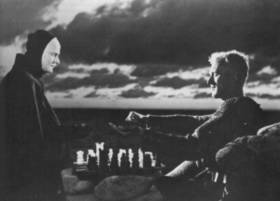Playing chess with Death
Wednesday, July 28, 2004
This is my hand. I can move it, feel the blood pulsing through it. The sun is still high in the sky and I, Antonius Block, am playing chess with Death.
I watched Ingmar Bergman's Seventh Seal again for the umpteenth time last night, and I continue to be amazed by it. Bergman truly is the genius that he is made out to be. Every tiny detail of his films, and especially this one, seems to be calculated. It is amazing how he is able to evoke the powerful emotions that he does, and delve in to the depths of philosophy through film. And his scripts really are poetry.
It's not that he's conveying some new information to us. Rather, he is able to resonate latent ideas within us with such power. He doesn't give us any new experiences, but rather points to past experiences of our own and makes us think about them in a new light. Well, I guess that's what all great artists do. They point at ideas that we are already familiar with, so that observer exclaims in agreement: "Yes, exactly!". And if you don't have within you that repertoire of past experiences to be resonated then it won't generate that excitement. Hmmm.
KNIGHT: Call it whatever you like. Is it so cruelly inconceivable to grasp God with the senses? Why should He hide himself in a mist of half-spoken promises and unseen miracles?
[DEATH doesn't answer.]
KNIGHT: How can we have faith in those who believe when we can't have faith in ourselves? What is going to happen to those of us who want to believe but aren't able to? And what is to become of those who neither want to nor are capable of believing?
[The KNIGHT stops and waits for a reply, but no one speaks or answers him. There is complete silence.]
KNIGHT: Why can't I kill God within me? Why does He live on in this painful and humiliating way even though I curse Him and want to tear Him out of my heart? Why, in spite of everything, is He a baffling reality that I can't shake off? Do you hear me?
DEATH: Yes, I hear you.
KNIGHT: I want knowledge, not faith, not suppositions, but knowledge. I want God to stretch out His hand towards me, reveal Himself and speak to me.
DEATH: But He remains silent.
KNIGHT: I call out to Him in the dark but no one seems to be there.
DEATH: Perhaps no one is there.
KNIGHT: Then life is an outrageous horror. No one can live in the face of death, knowing that all is nothingness.
DEATH: Most people never reflect about either death or the futility of life.
KNIGHT: But one day they will have to stand at that last moment of life and look towards the darkness.
DEATH: When that day comes ...
KNIGHT: In our fear, we make an image, and that image we call God.
I've always thought that the above dialogue very closely resembles the verses of an Urdu qawwali often sung by the late Nusrat Fateh Ali Khan called "Tum ek gorakh dhanda ho" ("You are a puzzle"). Sorry, I can't recall the name of the poet who originally wrote it. The only difference is that whereas in the above dialogue the Knight seems to be in dire frustration over the Divine and Eternity, in this qawwali, the poet contrastingly celebrates and revels in the confusion that is God. Here is a short excerpt from the poem (from here,... sorry this English translation is not very good):
I couldn’t find you anywhere
But the spectacle is that You are there
If there is none but you
Then I cannot understand why you veil Yourself
You are manifest in the houses of worship
Your light is resplendent in these places
He who is lost in your love is rewarded
You can not be found either in a temple or the Ka’bah
But you can be found in a broken heart
Sometimes you are hidden as non-existence
But somewhere you appear as existence
If you are Not then why deny?
For the negation itself confirms your existence
The one I call my Existence, who is that if not you?
If you didn’t come in to my thoughts
Then how did I ever learn that you are God?
You are a Puzzle


7/30/2004 02:32:00 pm
Its an awesome movie. The best scene is in the confession box when Block doesn't realise that it is Death who is listening to his confession.
In a similar vein Bergman's The Virgin Spring is well worth seeing.